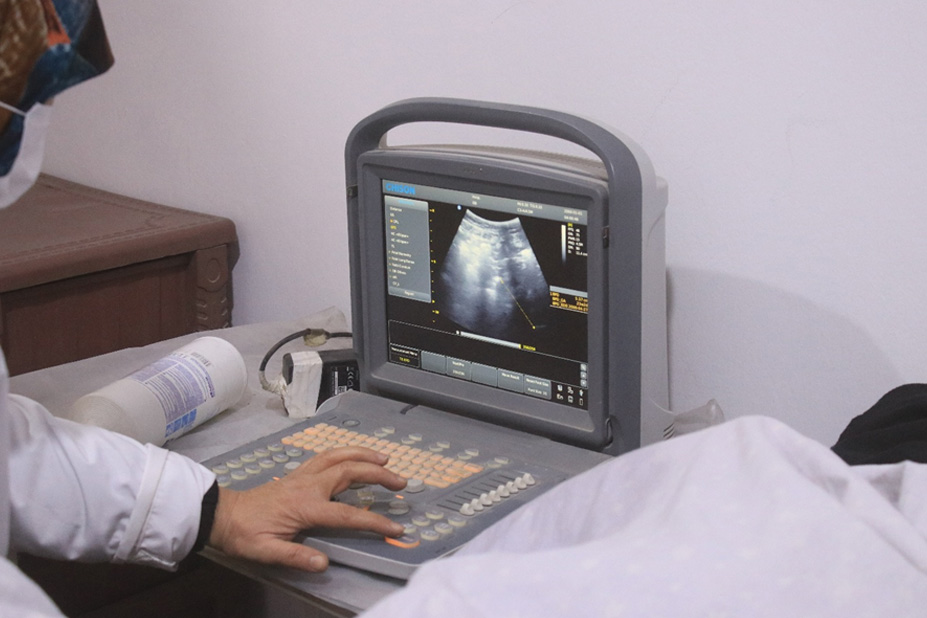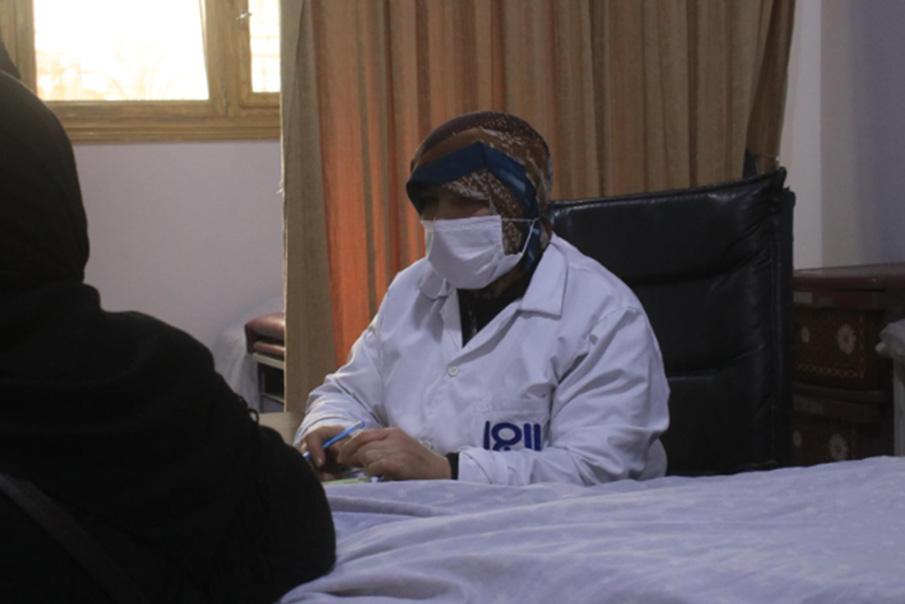 Wafaa Al-Doush performs a routine ultrasound, checking on the health of an expecting mother and her baby. Photo: WHO26 February 2025, Aleppo, Syrian Arab Republic – Wafaa Al-oush has no doubts about what her role as a midwife entails – it is a mission to ensure every mother and baby receive the care they need. Living in Al-Bab, in northern Aleppo, with her husband and young child, she has worked at Al-Ameen Medical Centre for the past 4 years, providing essential maternal health services.
Wafaa Al-Doush performs a routine ultrasound, checking on the health of an expecting mother and her baby. Photo: WHO26 February 2025, Aleppo, Syrian Arab Republic – Wafaa Al-oush has no doubts about what her role as a midwife entails – it is a mission to ensure every mother and baby receive the care they need. Living in Al-Bab, in northern Aleppo, with her husband and young child, she has worked at Al-Ameen Medical Centre for the past 4 years, providing essential maternal health services.
“Every day women come to us full of worries, not just about their pregnancy but about how they will afford food, shelter and medical care for their babies,” says Wafaa. “Sometimes they just need someone to listen, to reassure them that they are not alone.”
A lifeline for maternal health
In northwest Syria, where accessing maternal health care can be a major challenge, Wafaa’s role is critical. In 2025, 15.8 million people will need humanitarian health assistance across the country, many of them women and children. Syria, where years of conflict and natural disasters have made accessing health care even more difficult, is also home to 7.4 million internally displaced people.
“Many women here face challenges getting prenatal care because of the distance to health centres and the costs involved,” explains Wafaa. “Our clinic is often the only option for these women to receive safe and timely care.”
The Al-Ameen Medical Centre serves as a vital health care hub, offering free services to thousands of women in need. Expectant mothers receive prenatal checkups, family planning support and essential maternal health guidance to help ensure safer pregnancies and deliveries.
One of Wafaa’s patients, Rana, a mother of 2, was hesitant to seek care for her third pregnancy.
“I kept delaying my visits because I was afraid of the cost,” she says. “I didn’t realize how much I needed help until I started feeling weak and dizzy all the time. The midwives here didn’t just treat me, they made me feel safe.”
Saving lives against the odds
 Wafaa Al-Doush reassures her patient with care and compassion. Photo: WHODespite the rewarding nature of her work, Wafaa faces daily challenges. Too often women arrive late in their pregnancies, unaware of complications that could have been managed with earlier care.
Wafaa Al-Doush reassures her patient with care and compassion. Photo: WHODespite the rewarding nature of her work, Wafaa faces daily challenges. Too often women arrive late in their pregnancies, unaware of complications that could have been managed with earlier care.
“I remember one case where a mother arrived in critical condition due to untreated preeclampsia,” she recalls. “She had been feeling unwell for weeks but didn’t come in because she didn’t have the money for transportation. Immediate intervention saved both her and her baby’s life.”
In northwest Syria, over 30 health facilities – including major hospitals – were damaged or destroyed in front-line areas of Idlib and western Aleppo, leaving communities without essential care. The destruction of these facilities has put enormous pressure on the few that remain functional.
“There are entire areas where hospitals no longer exist,” say Wafaa. “Women in labour have to travel for hours to find a place to deliver safely. Some don’t make it in time.”
In northwest Syria, over 100 health facilities are at risk of closure. Across the country, just 57% of hospitals and 37% of primary health care centres remain fully functional. The need for support has never been greater.
Keeping health care services running
KSrelief is supporting more than 50 health facilities across northwest Syria, ensuring that critical medical care remains available. This assistance helps hospitals, clinics and maternity centres stay open and deliver lifesaving services to communities affected by conflict, displacement and the 2023 earthquake.
By funding staff salaries, providing essential medicines, medical equipment and strengthening referral systems, KSrelief’s support ensures that mothers and newborns receive the care they need, at no cost. Since November 2024, over 154 000 people in northwest Syria have benefitted from consultations, treatments and surgeries.
A future in which every mother receives care
For Wafaa, the impact of her work keeps her motivated.
“I dream of a future where no mother has to fear giving birth,” she says. “Where hospitals are restored, where clinics have enough supplies, where women can walk into a health centre and know they will be cared for, no matter what.”




